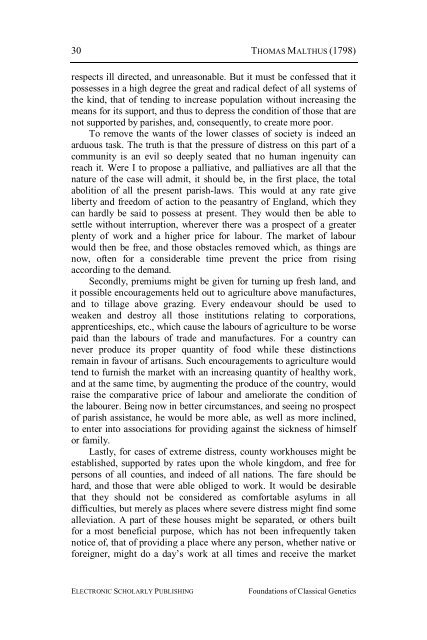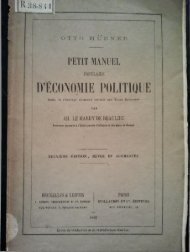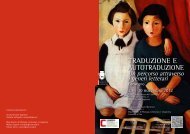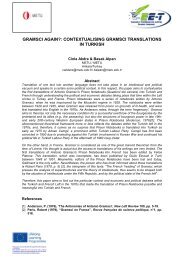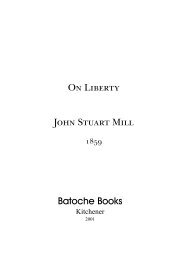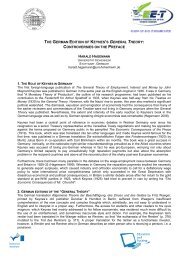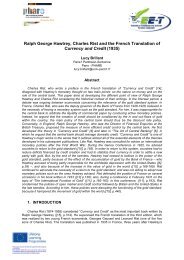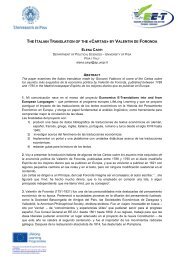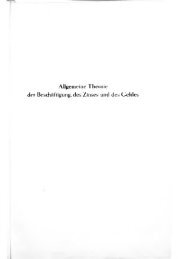Malthus, Thomas, Robert, An Essay on the Principle of Population ...
Malthus, Thomas, Robert, An Essay on the Principle of Population ...
Malthus, Thomas, Robert, An Essay on the Principle of Population ...
You also want an ePaper? Increase the reach of your titles
YUMPU automatically turns print PDFs into web optimized ePapers that Google loves.
30 THOMAS MALTHUS (1798)<br />
respects ill directed, and unreas<strong>on</strong>able. But it must be c<strong>on</strong>fessed that it<br />
possesses in a high degree <strong>the</strong> great and radical defect <strong>of</strong> all systems <strong>of</strong><br />
<strong>the</strong> kind, that <strong>of</strong> tending to increase populati<strong>on</strong> without increasing <strong>the</strong><br />
means for its support, and thus to depress <strong>the</strong> c<strong>on</strong>diti<strong>on</strong> <strong>of</strong> those that are<br />
not supported by parishes, and, c<strong>on</strong>sequently, to create more poor.<br />
To remove <strong>the</strong> wants <strong>of</strong> <strong>the</strong> lower classes <strong>of</strong> society is indeed an<br />
arduous task. The truth is that <strong>the</strong> pressure <strong>of</strong> distress <strong>on</strong> this part <strong>of</strong> a<br />
community is an evil so deeply seated that no human ingenuity can<br />
reach it. Were I to propose a palliative, and palliatives are all that <strong>the</strong><br />
nature <strong>of</strong> <strong>the</strong> case will admit, it should be, in <strong>the</strong> first place, <strong>the</strong> total<br />
aboliti<strong>on</strong> <strong>of</strong> all <strong>the</strong> present parish-laws. This would at any rate give<br />
liberty and freedom <strong>of</strong> acti<strong>on</strong> to <strong>the</strong> peasantry <strong>of</strong> England, which <strong>the</strong>y<br />
can hardly be said to possess at present. They would <strong>the</strong>n be able to<br />
settle without interrupti<strong>on</strong>, wherever <strong>the</strong>re was a prospect <strong>of</strong> a greater<br />
plenty <strong>of</strong> work and a higher price for labour. The market <strong>of</strong> labour<br />
would <strong>the</strong>n be free, and those obstacles removed which, as things are<br />
now, <strong>of</strong>ten for a c<strong>on</strong>siderable time prevent <strong>the</strong> price from rising<br />
according to <strong>the</strong> demand.<br />
Sec<strong>on</strong>dly, premiums might be given for turning up fresh land, and<br />
it possible encouragements held out to agriculture above manufactures,<br />
and to tillage above grazing. Every endeavour should be used to<br />
weaken and destroy all those instituti<strong>on</strong>s relating to corporati<strong>on</strong>s,<br />
apprenticeships, etc., which cause <strong>the</strong> labours <strong>of</strong> agriculture to be worse<br />
paid than <strong>the</strong> labours <strong>of</strong> trade and manufactures. For a country can<br />
never produce its proper quantity <strong>of</strong> food while <strong>the</strong>se distincti<strong>on</strong>s<br />
remain in favour <strong>of</strong> artisans. Such encouragements to agriculture would<br />
tend to furnish <strong>the</strong> market with an increasing quantity <strong>of</strong> healthy work,<br />
and at <strong>the</strong> same time, by augmenting <strong>the</strong> produce <strong>of</strong> <strong>the</strong> country, would<br />
raise <strong>the</strong> comparative price <strong>of</strong> labour and ameliorate <strong>the</strong> c<strong>on</strong>diti<strong>on</strong> <strong>of</strong><br />
<strong>the</strong> labourer. Being now in better circumstances, and seeing no prospect<br />
<strong>of</strong> parish assistance, he would be more able, as well as more inclined,<br />
to enter into associati<strong>on</strong>s for providing against <strong>the</strong> sickness <strong>of</strong> himself<br />
or family.<br />
Lastly, for cases <strong>of</strong> extreme distress, county workhouses might be<br />
established, supported by rates up<strong>on</strong> <strong>the</strong> whole kingdom, and free for<br />
pers<strong>on</strong>s <strong>of</strong> all counties, and indeed <strong>of</strong> all nati<strong>on</strong>s. The fare should be<br />
hard, and those that were able obliged to work. It would be desirable<br />
that <strong>the</strong>y should not be c<strong>on</strong>sidered as comfortable asylums in all<br />
difficulties, but merely as places where severe distress might find some<br />
alleviati<strong>on</strong>. A part <strong>of</strong> <strong>the</strong>se houses might be separated, or o<strong>the</strong>rs built<br />
for a most beneficial purpose, which has not been infrequently taken<br />
notice <strong>of</strong>, that <strong>of</strong> providing a place where any pers<strong>on</strong>, whe<strong>the</strong>r native or<br />
foreigner, might do a day’s work at all times and receive <strong>the</strong> market<br />
ELECTRONIC SCHOLARLY PUBLISHING<br />
Foundati<strong>on</strong>s <strong>of</strong> Classical Genetics


